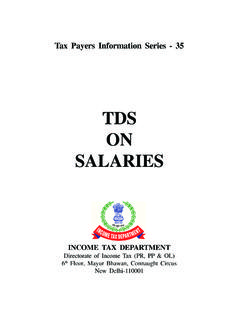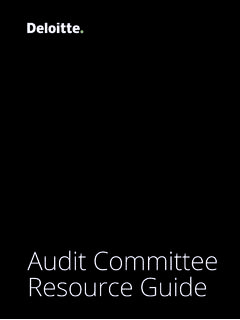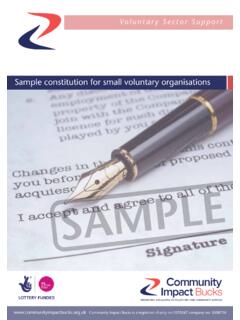Transcription of Assessment of Charitable Trusts and Institutions - Income Tax …
1 Income TAX DEPARTMENTD irectorate of Income Tax (PR, PP & OL)6th Floor, Mayur Bhawan, Connaught Circus,New Delhi-110001 Tax Payers Information Series - 37 Assessment ofCharitable Trustsand InstitutionsThis booklet should not be construed as anexhaustive statement of the Law. In case of doubt,reference should always be made to the relevantprovisions in the Acts and the number of Non Governmental Organizations across theworld are supplementing the efforts of the Government in promotingsocial welfare and economic development. Tax administrations havealso recognized the voluntary efforts of these NGOs and providedtax incentives to those engaged in Charitable activities. The presentbooklet under Tax Payer Information Series is an attempt toeducate the taxpayers in NGO sector, be it a public trust orassociation or other non profit entity, of the reliefs provided underthe Income Tax Act, 1961 for Charitable activities.
2 A part fromexplaining the concept of Charitable Purposes , the booklet hasalso touched upon the procedure for registration, Assessment , denialof exemptions, incentives given to the donors of the trust booklet has been authored by Sh. Parneet Singh Sachdev,Pr. CIT- 4, Hyderabad. It is a continuation of our earlier booklettitled Assessment of Charitable Trusts & Institutions which waspublished in 2012, and required to be revised due to changes in thetax provisions. Sh. Parneet Singh Sachdev has updated the bookletincorporating all amendments made by the Finance Act, is hoped that this booklet will be of help to those who haveto deal with the provisions relating to the Charitable Trusts am sure that this updated edition will be widely used by allthe users.
3 Any suggestion for further improvement of the bookletis DelhiDated : (Surabhi Ahluwalia)Addl. Director General(PR, PP & OL)CONTENTSPAGE Structure and of Charitable Trusts & of Income of a Charitable13or Religious Trust or of Exemption and its under Section 80G(5) of Award or Reward under Section 10 (17A) under Section 10(23C) under Section 35(1)(ii)/(iii) and35 Exemption under Section 10(21) Asked Questions (FAQs) Non-Governmental Organizations (NGOs), whether publictrusts, associations, or other non-profit entities (including non-profitcompanies), perform a vital role in supplementing governmentalefforts in promoting economic development and social is a need for such organizations not only because theresources at the command of the government are insufficientrelative to need, but also because of their outreach and the wealthof local knowledge they possess, all of which can fruitfully be utilizedfor the benefit of society.
4 NGOs exist in all countries, whetherdeveloped or developing. Tax administrations the world overrecognize voluntary effort and provide incentives to genuinecharitable organizations. Most often, this is done by either partiallyor fully exempting their incomes from tax, and also by providingtax incentives to donors in order to encourage them to contributeresources to such organizations. The Indian Income Tax Act, 1961too incorporates several provisions to extend tax breaks andincentives to such organizations as well as to their Recognizing the need to inform assessees as well as the generalpublic about taxation provisions relating to religious and charitabletrusts and Institutions , which are considerably different from thelegal provisions dealing with other taxable entities such as businessconcerns, the then Directorate of Income Tax (RSP&PR), publisheda booklet on the subject entitled Assessment of Charitable Trusts & Institutions in the year 2002 under its Taxpayer InformationSeries.
5 Needless to say, much time has elapsed since the publicationof that booklet, and, in the meantime, several changes have takenplace in the legal provisions as well as in the procedural requirementsfor claiming exemption. In this updated version, every effort hasbeen made to incorporate the changes in law and procedures uptoassessment year Like its earlier version, this booklet contains a brief narrationof law and procedures as they stand at the time of its forms which have to be used by the assessees in order to availof the benefit of various provisions are compiled as Annexures tothe booklet. It may be noted, however, that this booklet is not meantto be an exhaustive or authoritative exposition of law. In case ofany doubt, taxpayers may please refer to the relevant Acts, Rulesand the latest judicial decisions on the STRUCTURE The provisions relating to the Institutions and entities entitledto exemption under the direct tax laws are administered mainly byDirector General of Income Tax (Exemption) and the Directoratesheaded by the Director of Income Tax (Exemption) working underthe Director General of Income Tax (Exemption) in seven cities,namely, Delhi, Kolkata, Ahmedabad, Mumbai, Chennai, Hyderabadand Bangalore.
6 In places not covered under the jurisdiction ofaforesaid seven Directorates, the said provisions are administeredby the territorial Commissioners of Income Tax (CsIT). The hierarchy of central government authorities dealing withcharitable and religious Trusts and Institutions entitled to variouskinds of tax incentives under the I-T Act is briefly as follows:(i)The Central Government;(ii)The Central Board of Direct Taxes (CBDT);(iii)The Director General of Income Tax (DGIT);(iv)The Director/Commissioner of Income Tax (DIT/CIT);(v)The Additional/Joint Director/Commissioner of IncomeTax ( );(vi)The Deputy/Assistant Director/Commissioner ofIncome Tax (DDIT/ DCIT/ADIT/ACIT);32(vii)The Income Tax Officer (ITO); and(viii)The Inspector of Income Tax (ITI).
7 As is clear from the above, outside of the seven cities whereDir ector s of Income Ta x (Exemption) a r e loca ted, theCommissioners of Income Tax and the I-T authorities working belowthem perform functions parallel to that of the Directorate withintheir respective jurisdictions. In fact, the Act makes mention onlyof Commissioner of Income Tax. However, the Central Board ofDirect Taxes (CBDT), in exercise of it's powers under the Act,has authorized1 the Director of Income Tax (Exemptions) todischarge all the functions of CIT in the aforesaid The expression Charitable purpose has been defined underSection 2(15) of the Act to include:(a)relief of the poor,(b)education,(c)medical relief, and(d)advancement of any other object of general public Prior to Assessment Year 2009-10, business Income of acharitable trust or institution was also eligible for exemption subjectto conditions that such business should be incidental to the attainmentof its objects, and that separate books of account are maintainedfor such business.
8 With effect from ( , from assessmentyear 2009-10 onwards), however, the advancement of any otherobject of general public utility shall not qualify as a charitablepurpose if the same involves the carrying on of any activity in thenature of trade, commerce or business, or rendering of any servicein relation to any trade, commerce or business, for a new restriction applies irrespective of the nature of use orapplication of the Income arising from such activity. However, therigour of this amendment has been reduced somewhat by asubsequent amendment brought in by the Finance Act, 2010 (withretrospective effect from 1-4-2009)* to the effect that the saidrestriction shall not apply if the aggregate value of receipts fromsuch activity during the given financial year does not exceedRs.
9 25,00, Notification 880(E) dated * 1-4-2009 the ceiling was ` 10,00,000. It was subsequently 01-04-2012 to ` 25,00, Further, , preservation of environment (includingwatersheds, forests and wildlife), and preservation of monumentsor places, or objects of artistic or historic interest have specificallybeen included within the ambit of Charitable purpose . It may be added that the definition of Charitable purpose remains an inclusive one and is not an exhaustive or exclusive other words, purposes similar to those mentioned in the aforesaiddefinition could also constitute Charitable purpose under the have held that the expression Charitable purpose issufficiently wide in scope to include a variety of activities.
10 Forinstance, promotion of sports and games is a Charitable purpose3,as is promotion of trade and commerce, even when the beneficiariesare confined only to a particular line of trade or commodity4. Atthe same time, however, the fact that remote and indirect benefitsare derived by members of the public will not be sufficient to makethe purpose a Charitable purpose under the Act. Mentioned beloware a few significant cases which help clarify the meaning of theexpression Charitable purpose for the purposes of Income The word Charity connotes altruism in thought and action. Itinvolves an idea of benefiting others rather than A commercial concern is not an object of relief of the poor onthe ground that it provides employment.

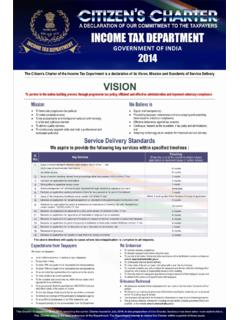

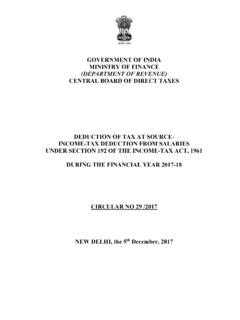


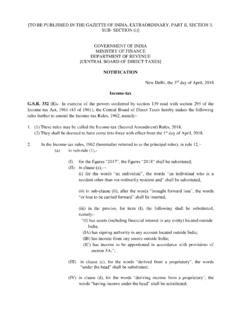
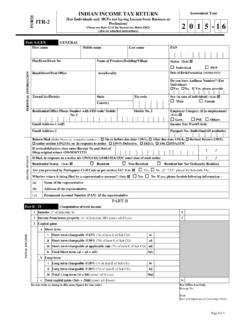
![FORM NO. 3CA [See rule 6G(1)(a)] Audit report …](/cache/preview/5/e/9/7/6/b/7/4/thumb-5e976b74d05a63207c471fc48a86f3e5.jpg)
